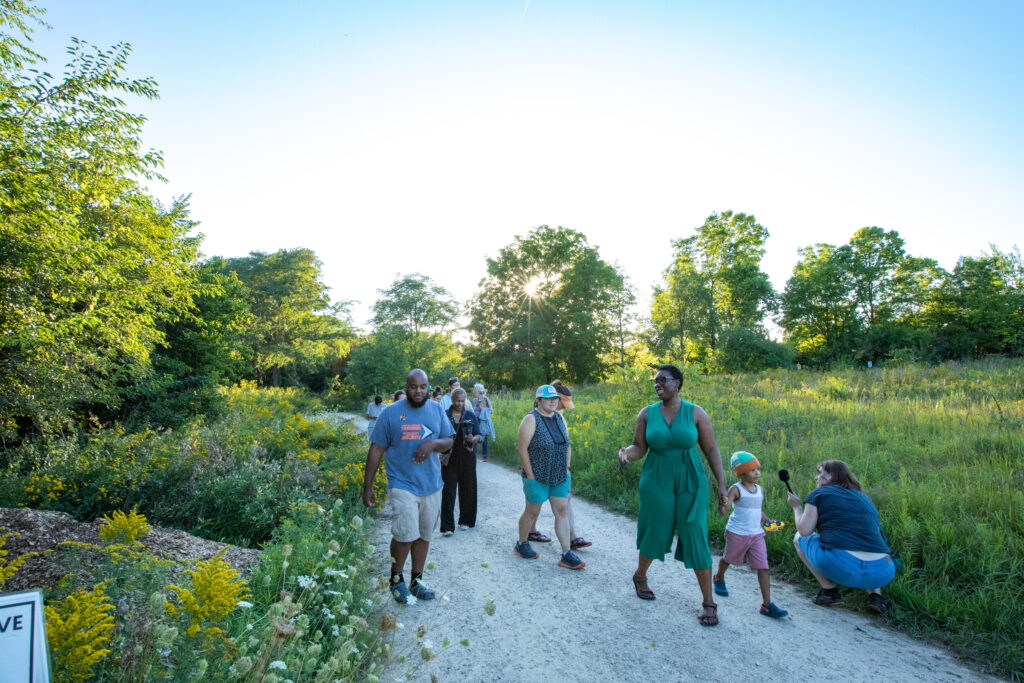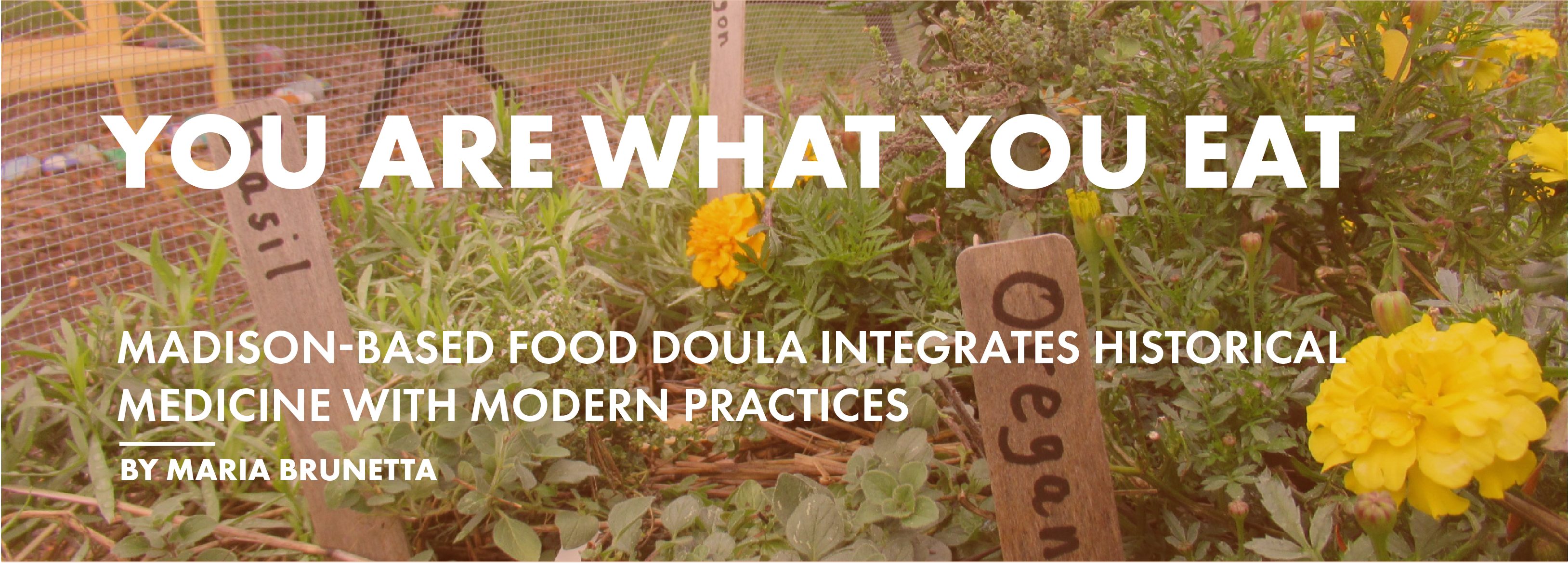“It’s not just the land that’s broken, but more importantly our relationship with the land.”
— Robin Wall Kimmerer, “Braiding Sweetgrass”

Qwantese Dourese Winters believes food is medicine. The Madison-based agriculturalist and food doula uses natural medicine and eats a healthy diet with lots of vegetables. But that doesn’t mean she’s not immune from craving processed foods every once in a while. “If I get a craving for Hot Cheetos, I’m gonna eat Hot Cheetos,” Winters says.
Since the beginning of time, humans have known that nature could provide them with what they needed to survive, familiarizing themselves with what was available and later specializing on nature’s medicinal benefits.
Humans evolved drastically, advancing technologies that improved medicine but health care became more transactional rather than transformational, forgetting the importance of healing practices that were passed through generations. This often discredits people’s experiences, especially those of Black and Brown people. But Wisconsinites like Winters are finding ways to fuse modern medicine and historical medicine rather than seeing them as parallels in somebody’s healing journey.
Healing through nature and food
Winters, a 29-year-old Black woman who considers herself a Madison native after moving from the suburbs of Chicago at a young age, has found ways to blend her love of nature, agriculture and childbirth together.
In her doula work, she provides care for people who are giving birth, supporting them throughout their pregnancies specifically cooking recipes with medicinal benefits. Because of this, a doula mentor dubbed Winters a “food doula” — and it stuck.
“I’m serving, growing different herbs for their body, all for the purpose of helping them connect with the medicine that I believe is in food,” Winters says.
She learned firsthand about the medicinal power of food after battling her own sickness, which led to a three-day hospitalization.
“At that time, I was like a size zero. I couldn’t keep down food and couldn’t keep down water,” Winters says. “And one day my mom was just like, I’m gonna cook for you.”
In her mind, the meal was nothing nutritious. It was the collard greens and cornbread, a traditional African American dish they would typically eat during a holiday. After she ate that for a month, her appetite came back, and she started feeling better.
“I think that there’s also something to be said, too, about just the fact this is a traditional African American dish,” Winters says. “And I think it just goes to show that our ancestors, whatever culture you may come from, knew this stuff. They knew that food was medicine.”
Winters adds that’s the reason why certain dishes are important parts of several cultures.
REAP Food Group, an organization with the mission of transforming local communities and economies with food, knows the healing power traditional dishes can have on an underrepresented community.
Through partnerships with other small farms farmers of different racial and ethnic backgrounds and other community organizations like Roots4Change, the group was able to help Latinx families source produce and food that are culturally relevant to their communities.
“We serve the corn tortilla directly from a local vendor that nixtamalize the tortillas,” says Yolibeth Rangel, REAP’s community partnership coordinator, describing the process for preparing maize. “It allows the body to absorb the nutrients of the corn better than if you don’t. It gives the tortillas a flavor that is like home. That flavor is not added in the end, it’s a natural process.”
Fusing with health care
It’s not just community organizations that recognize the importance of integrating natural medicine, but also at UW Health with doctors who realize the limitations of today’s healthcare system.
“The old model of health care was this, find it, fix it pill for every ill approach,” says Dr. David Rakel, the department chair of family medicine and community health at the UW School of Medicine and Public Health, and family medicine doctor at UW Health. “If that’s the only tool we’re using in our tool bag, we often wait for the disease to settle in, and then try and reverse it with our technology, which works very poorly.”
Rakel began his career as a small-town doctor in a private practice, where he began noticing the limitations of a pharmaceutical-only approach to keeping his patients healthy. So, he went to do a fellowship in integrative medicine, which he later wrote the textbook about.
Integrative medicine brings together the best parts of modern medicine, like surgery and pharmaceuticals, and complementary approaches, like mindfulness, acupuncture, nutrition and natural medicine, in a way that honors the values and goals of an individual.
“We teach medical students about a concept called shared decision making,” says Dr. David Kiefer, clinical assistant professor in the department of family medicine and community health with an appointment at the UW School of Medicine and Public Health. “In contrast to a physician telling a patient what to do, we alternatively check in with a patient and make sure that the plan is acceptable.”
They recognize that all patients are different and need health tailored to their experiences whether that be spiritual beliefs, family background, lived experiences or beliefs.
“People don’t want to take a handful of pills every day,” Rakel says. “They want to use their native traditions that have worked for them and their family for centuries.”
According to Rakel there are, “less invasive, less harmful, foundational ingredients that every human being needs to be healthy.” Nutrition is a foundational one for reducing the prevalence of chronic disease.
“If all we did was improve nutrition, we would reduce the incidence of diabetes by 70%, which we spend about a trillion dollars of our $4.3 trillion health care system just on diabetes and its consequences alone,” Rakel says.
Through her food doula work, Winters also recognizes just how foundational food can be to health.
“A lot of other cultures have those rituals and processes that people go through after they give birth and things like that, to help them to heal better,” Winters says. “But in America, we don’t and it’s more so focused on how quickly can you, snap back and how quickly can you get back to work, and so there’s really not an emphasis on nourishing and nurturing your body.”
Rakel founded the integrative health program at UW-Madison in 2001 with a small practice, minimal massage therapy options and the existing Mindfulness-Based Stress Reduction program, but it has since grown to become one of the nation’s largest and most successful integrative health programs in the country.
In December 2022, the Osher Center for Integrative Health was established at UW–Madison to expand education and access to integrative health care.
The “Wisconsin Idea” remains as the motto for UW–Madison, signifying that education should influence people’s lives beyond the boundaries of the classroom.
But, Rakel believes that idea should shift.
“The old Wisconsin idea is you need our science to be better,” Rakel says. “The new Wisconsin idea is we first need to listen to you and then use your unique needs to guide our science.”
Creating spaces for learning
But while there is a growing acceptance of integrative medicine, many people don’t see nature as a space for healing.
Winters felt it was inaccessible, recalling that a lot of the hobbies she does now, were considered “white people things.”
“I had to persevere through a lot of negative thoughts about my place within the outdoors in order to establish who I am today,” Winters says. “Being outdoors and you know, anything that wasn’t a barbecue or like going to the public pool was considered like not a Black thing to do.”
Now, Winters is on a mission to educate others about the outdoors. She wears many hats in addition to being a food doula and agriculturist. She’s a co-host for PBS Wisconsin’s “Let’s Grow Stuff,” a gardening show, she has an active Instagram account in which she shares content related to her work, and she was Madison Public Library’s naturalist-in-residence in September 2023.
The naturalist-in-residence program is a way to reintroduce people to nature especially those who feel detached from it. During the month-long program, Winters led everything from herbalism workshops such as a rosemary and rose petal apple cider hair rinse, meditative nature walks and cooking and foraging classes.
The library and Winters help foster spaces where people can feel comfortable and connect with nature, trusting that it can provide them tools for healing.
Liz Boyd, a biracial woman and the marketing specialist at the library, says having representation from people like Winters helps other Black and Brown people feel safer in nature.
“I’ve definitely felt as a Black woman, biracial woman myself, being out on trails and being in different natural spaces, the side eye or the double take of ‘Whoa, what are you doing here?’” Boyd says.
But it’s all about finding a balance between trusting nature and eating food that’s medicinal — and trusting that modern medicine can also do a lot of good. Winters suggests that it’s important to be intuitive and know where your boundaries are about certain things.
“The first thing to do is just to focus on loving yourself and focus on doing inventory about how what you’re eating and how what you’re taking into your body is actually making you feel,” Winters says.
